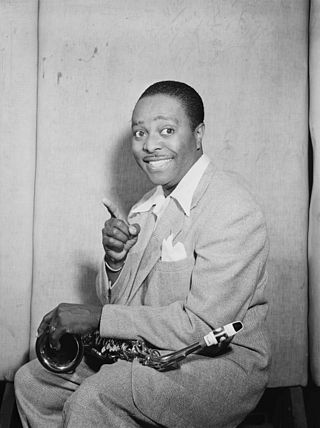
Louis Thomas Jordan was an American saxophonist, multi-instrumentalist, songwriter and bandleader who was popular from the late 1930s to the early 1950s. Known as "the King of the Jukebox", he earned his highest profile towards the end of the swing era. He was inducted into the Rock and Roll Hall of Fame as an "early influence" in 1987.

Georgia Gibbs was an American popular singer and vocal entertainer rooted in jazz. Already singing publicly in her early teens, Gibbs achieved acclaim and notoriety in the mid-1950s copying songs originating with the black rhythm and blues community and later became a featured vocalist for many radio and television variety and comedy programs. Her key attribute was tremendous versatility and an uncommon stylistic range from melancholy ballad to uptempo swinging jazz and rock and roll.

Harry Warren was an American composer and the first major American songwriter to write primarily for film. He was nominated for the Academy Award for Best Original Song eleven times and won three Oscars for composing "Lullaby of Broadway", "You'll Never Know" and "On the Atchison, Topeka and the Santa Fe". He wrote the music for the first blockbuster film musical, 42nd Street, choreographed by Busby Berkeley, with whom he would collaborate on many musical films.

Plan-It-X Records (PIX) was an independent record label. Originally based in Georgetown, Indiana, PIX was based in Bloomington, Indiana following brief stints in Olympia, Washington, Gainesville, Florida, and Cairo, Illinois. The label released folk punk and pop punk music, including Against Me!'s Crime As Forgiven By, other releases include albums by This Bike Is a Pipe Bomb, Defiance, Ohio, Ghost Mice, Japanther, The Bananas, Operation: Cliff Clavin, and Antsy Pants and Fifteen.

Glenn Miller and His Orchestra were an American swing dance band formed by Glenn Miller in 1938. Arranged around a clarinet and tenor saxophone playing melody, and three other saxophones playing harmony, the band became the most popular and commercially successful dance orchestra of the swing era and one of the greatest singles charting acts of the 20th century. As of 2024, Ray Anthony is the last surviving member of the orchestra.

WBBR is a Class A clear-channel radio station licensed to New York City. It serves as the flagship station of Bloomberg Radio, Bloomberg L.P.'s radio service. The station offers general and financial news reports 24-hours a day, along with local information and interviews with corporate executives, economists, and industry analysts.
Rob Dehlinger is a singer, trumpet player, and composer living in the San Francisco Bay Area. He is the frontman for “Robert Dehlinger’s Alpha Rhythm Kings”.

John Chalmers MacGregor, better known as Chummy MacGregor, a musician and composer, was the pianist in The Glenn Miller Orchestra from 1936 to 1942. He composed the songs "Moon Dreams", "It Must Be Jelly ", "I Sustain the Wings", "Doin' the Jive", "Sold American", "Cutesie Pie" in 1932 with Bing Crosby and Red Standex, and "Slumber Song".
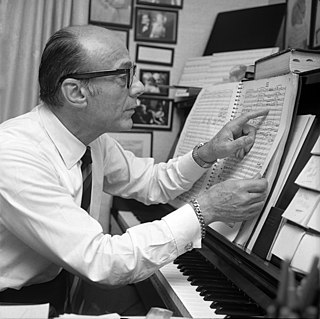
John Waldo Green was an American songwriter, composer, musical arranger, conductor and pianist. He was given the nickname "Beulah" by colleague Conrad Salinger. His most famous song was one of his earliest, "Body and Soul" from the revue Three's a Crowd. Green won four Academy Awards for his film scores and a fifth for producing a short musical film, and he was inducted into the Songwriters Hall of Fame in 1972. He was also honored with a star on the Hollywood Walk of Fame.

World War II was the first conflict to take place in the age of electronically distributed music.
"I'll Be Seeing You" is a popular song about missing a loved one, with music by Sammy Fain and lyrics by Irving Kahal. Published in 1938, it was inserted into the Broadway musical Right This Way, which closed after fifteen performances. The title of the 1944 film I'll Be Seeing You was taken from this song at the suggestion of the film's producer, Dore Schary. The song is included in the film's soundtrack.
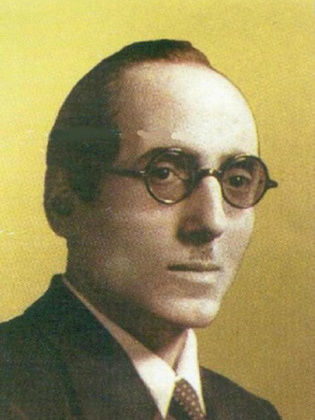
Mohamed el-Qasabgi was an Egyptian musician and composer, and is regarded as one of the five leading composers of Egypt in the 20th century. Most of his credits went to Umm Kulthum, Asmahan, and Layla Murad who sang most of his great works and scores. Until today, most critics classify Mohamed El Qasabgi as the master of the oud due to his great abilities and skills which he had during his time.
Ant-Bee is an American experimental musician and writer. In his musical work, he is a psychedelic era revivalist, working with members of The Mothers of Invention; the original members of the Alice Cooper group, and Captain Beefheart's Magic Band.
Clinton Conger Ballard Jr. was an American songwriter, singer, and pianist. He wrote two Billboard Hot 100 number one hits. The first was "Game of Love" by Wayne Fontana and The Mindbenders in 1965. The second was the 1975 hit, "You're No Good" by Linda Ronstadt. He wrote two UK number one singles, recorded by Jimmy Jones and The Hollies.
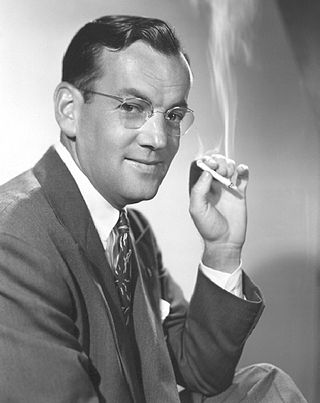
Between 1938 and 1944, Glenn Miller and His Orchestra released 266 singles on the monaural ten-inch shellac 78 rpm format. Their studio output comprised a variety of musical styles inside of the Swing genre, including ballads, band chants, dance instrumentals, novelty tracks, songs adapted from motion pictures, and, as the Second World War approached, patriotic music.
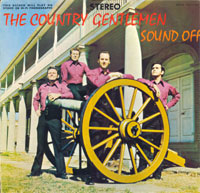
Sound Off is an album by the progressive bluegrass band Country Gentlemen, recorded in 1971.
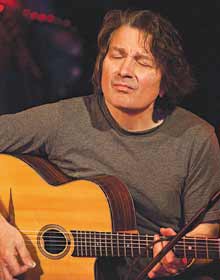
Reynold David Philipsek is an American guitarist, singer, songwriter, and poet.
Carl D. Hogan was an American jazz and rhythm and blues guitarist and bassist. He is known for playing the lead guitar riff on Louis Jordan's "Ain't That Just Like a Woman " which was later imitated by Chuck Berry for his hit "Johnny B. Goode".

Roger Pryor was an American film actor.

The Ginger Rogers filmography lists the film appearances of American actress Ginger Rogers, as well as her television, stage, and radio credits. Rogers's career spanned fifty-seven years, from 1930 to 1987.














